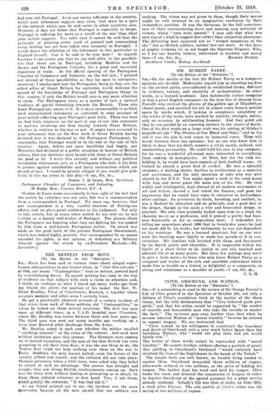THE RETREAT FROM MONS.
[To THE EDITOR OF THE " SPECTATOR."]
SIR,—Much has been said at various times about alleged super- human interpositions in our favour when, in " that dire autumn " of 1914, our heroic " Contemptibles " were in retreat, pressed hard by overwhelming forces. To myself nothing has come in the way of evidence on that subject with such a claim on attention and, I think, on credence as what I heard not many weeks ago from my friend (he allows the mention of his name) the Rev. IV. Elliot Bradley, Vicar of Crostliwaite, Keswick, a reporter whose accurate memory and sober sense I entirely trust.
He got a practically identical account of a certain incident of that crisis from each of three soldiers, old " Contemptibles," to whom he talked on three several occasions. The first two men were, at different times, in a V.A.D. hospital near Ulverston, where Mr. Bradley was rector between three and four years ago. The third man was seen not many months ago working on a farm near Keswick after discharge from the Army.
Mr. Bradley asked in each case whether the soldier recalled " anything unusual " at the crisis of the retreat. And each matt without hesitation gave this answer. The Germans were coming en in massed formation, and the men of the thin British line were preparing to sell their lives dear; it was the one thing to do; the Teuton host could not help walking over them on the way to Paris. Suddenly the grey masses halted; even the horses of the cavalry jibbed and reared; and the collision did not take place: German prisoners, taken a little later, were asked why they failed to attack at such an advantage. The answer was straight and simple; they saw strong British reinforcements coming up. Such was the story told, without leading or prompting as to detail, by these three isolated witnesses at first hand. Two, if not three,
added quietly the comment, " It was Clod did it." . • .
As my friend pointed, out to me, the incident was the more Issnressive because. all . the men agreed that our . soldiers saw
nothing. The vision was not given to them, though their nerves might be well strained to an imaginative exaltation by their tremendous position. It was the Germans, in the full conscious- ness of their overmastering force and seeming easy certainty of victory, whose " eyes were opened." I may add that what• was seen was of a kind to suggest fact rather than subjective phantasm. The delivering host appeared not as " winged squadrons of the sky " but as British soldiers, neither less nor more. At this hour of mighty victories let us not forget the Supreme Disposer, Who, as I for one humbly believe, intervened in mystery and mercy
then.—I am, Sir, &c.. HANDLES HUNELM. Auckland Castle, Bishop Auckland.


































 Previous page
Previous page